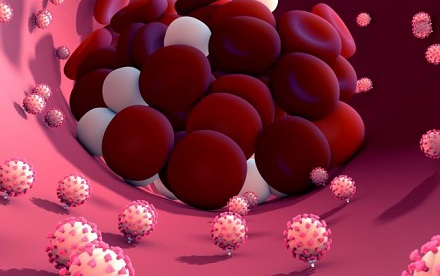Scientists Discover That The Protein Perlecan LG3 Commonly Found In Blood Vessels And The Brain Binds Readily With SARS-CoV-2 Spike Protein
Nikhil Prasad Fact checked by:Thailand Medical News Team Mar 24, 2024 1 year, 1 month, 2 days, 17 hours, 5 minutes ago
COVID-19 News: In the ongoing battle against the COVID-19 pandemic, researchers continue to delve into the intricate mechanisms of the SARS-CoV-2 virus to identify potential therapeutic targets. Recent breakthroughs from Tulane University, in collaboration with Florida International University that is covered in this
COVID-19 News report, have shed light on a protein called perlecan LG3, found abundantly in blood vessels and the brain, and its significant interaction with the virus's spike protein.
 Protein Perlecan LG3 Commonly Found In Blood Vessels And The
Protein Perlecan LG3 Commonly Found In Blood Vessels And The
Brain Binds Readily With SARS-CoV-2 Spike Protein
The Viral Entry Mechanism
When SARS-CoV-2 enters the human body, its spike protein plays a crucial role in binding to host cells, facilitating viral entry, replication, and infection. This initial binding event is a pivotal step in the viral life cycle and a key focus for researchers aiming to develop effective treatments.
Discovering the 'Glue': Perlecan LG3
The groundbreaking study highlights perlecan LG3 as a potential "glue" that aids the spike protein in adhering to host cells. Perlecan LG3 is a proteoglycan - a protein commonly found in the extracellular matrix of tissues, especially in blood vessels and the brain.
Dr Gregory Bix, co-corresponding author of the study and director of Tulane University School of Medicine's Clinical Neuroscience Research Center, underscores the significance of perlecan LG3's role. For over two decades, Dr. Bix has researched perlecan's implications in cerebrovascular diseases, such as stroke and dementia, making this discovery particularly impactful.
Molecular Interactions Unveiled
Utilizing molecular modeling simulations, the research team revealed a robust and stable interaction between perlecan LG3 and the receptor-binding domain (RBD) of the COVID spike protein. This interaction, confirmed through surface plasmon resonance (SPR) experiments, suggests that perlecan LG3 may enhance the virus's ability to bind to host cells, thus potentially contributing to its infectivity.
Of particular note is the identification of a specific hydrogen bond formation between the COVID spike protein and host cells, a bond that manifests prominently in the presence of perlecan LG3. This finding underscores the potential role of perlecan LG3 as a facilitator of viral attachment and entry into cells.
Implications for COVID-19 Pathophysiology and Therapeutic Strategies
The study's findings provide crucial insights into the pathophysiology of COVID-19. Understanding how perlecan LG3 influences viral binding and infectivity opens avenues for novel therapeutic interventions.
Dr Bix envisions potential applications such as decoy molecules derived from perlecan to inhibit viral binding or the development of antibodies targeting the LG3-spike protein
interaction. However, further investigations are warranted to explore how mutations in different SARS-CoV-2 strains may impact these binding interactions and potential therapeutic strategies.
Future Directions and Conclusion
As the COVID-19 landscape evolves with emerging variants and ongoing research efforts, unraveling the intricacies of viral-host interactions remains paramount. The identification of perlecan LG3 as a significant player in SARS-CoV-2 pathogenesis marks a pivotal step toward developing targeted interventions to combat the virus's spread and mitigate its impact on human health.
Continued collaboration between researchers, leveraging advanced technologies in molecular modeling and biochemical assays, will further elucidate the role of perlecan LG3 and other host factors in viral infections. This comprehensive approach is essential for advancing our understanding of COVID-19 and devising effective strategies to manage and treat this global health crisis.
The study findings were published in the peer reviewed journal: Protein Science.
https://onlinelibrary.wiley.com/doi/10.1002/pro.4843
For the latest
COVID-19-News, keep on logging to Thailand Medical News.
